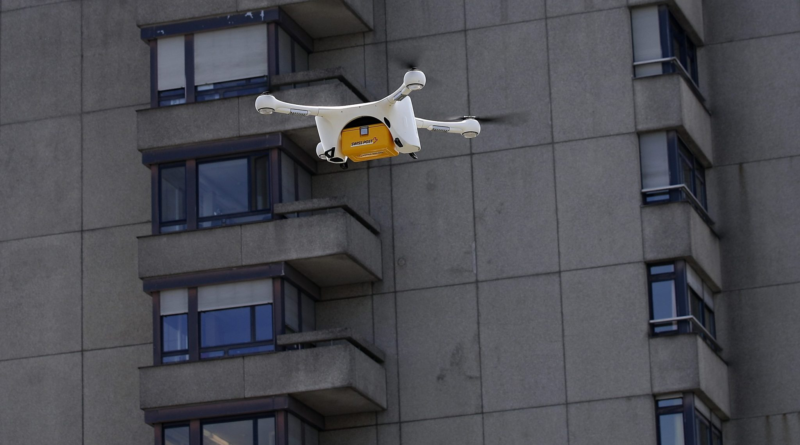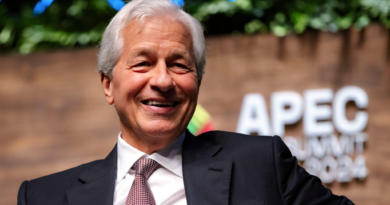What to make of the major milestone at drone startup Matternet, which helps UPS deliver packages
My Uber driver sighed loudly—as he had been doing every half hour or so. Earlier, he had alerted me that this would be his longest drive yet as he verbally debated with himself whether to accept my ride request. I didn’t blame him. After all, it’s a 40-mile trek to Pittsburg, Calif., a northern suburb of San Francisco I hadn’t heard of before earlier that week. As heavy traffic forced us into a slow roll, it would end up taking nearly two hours before I saw a white, miniature autonomous aircraft hovering to my right off the side of the road—the first indication that we had finally arrived at drone startup Matternet’s testing site, albeit quite a bit later than I had expected.
When I apologized to the driver and stepped out of his sedan, there were a few drones taking off, landing, and zooming about the property, which is a former golf course the team converted into a drone site in July 2021. Matternet, the Mountain View, Calif.-based drone company that has been making drone deliveries with UPS since 2019, selected this location, seemingly off the beaten path, for its clear weather, moderate wind, and smaller population, though it’s also a commute for people who stop by—and for some of its staffers.
But this is the sacrifice a startup makes to test out a drone operation near an urban area. Regulation has been, and continues to be, a key barrier to scale for drone delivery startups, and has repeatedly pushed back consumer anticipation that drones will deliver them snacks and become part of everyday life. The Federal Aviation Administration maintains strict rules over when drones can fly, under what conditions, and whether they can go beyond a person’s visual line of sight (or, to use the industry jargon, BVLOS).
But in September, the startup Matternet made an enormous first step towards scaling its operations when it became the first non-military drone company to attain the FAA’s “type certification.” In plain English, that means that Matternet’s M2 drone fleet has been deemed airworthy and safe to transport cargo and make deliveries over people. Prior to this industry milestone, drone companies experimenting with drone delivery or running small-scale pilot programs have been operating under a less-streamlined exemption process—one the FAA may sunset near the end of this year if Congress doesn’t vote to extend it.
As I sit down with Jim O’Sullivan, Matternet’s vice president of regulatory strategy and special projects, at the testing site, he’s visibly excited about what all of this will mean for drone delivery and, particularly, for health care. Matternet, which now has a fleet of approximately 100 drones and about 60 team members in the U.S. and Switzerland, had been working with the FAA towards the certification for four and a half years, down to measuring the sounds that Matternet’s drones make when they fly.
Without being able to fly beyond the human eye, “Yes, we can deliver samples a block away, and it looks cool, but it doesn’t really solve anything for the customer,” he says. “Things start to make sense when you get to BVLOS,” he says.
Matternet CEO Andreas Raptopoulos explained to me that the company now has more flexibility when it comes to flying over people, crossing over highways and streets, and flying beyond where the eye can see. In other words, Matternet is one step closer to the most profitable sector of the drone delivery space: deliveries at scale beyond the visual line of sight of the pilot.

Stefan Wermuth—Getty Images
Drone enthusiasts often circle back to the transformative potential for this autonomous technology—how rural communities can get better access to vaccines or emergency aid, and how it could make supply chains more efficient and reduce emissions. If drones manage to take cars off the street here and there, perhaps an Uber ride to Pittsburg wouldn’t take quite so long.
All of this could still be ways off: Regulators are still finishing up BVLOS rulemaking, there isn’t the infrastructure in place for large-scale drone delivery, particularly in urban areas, and drone battery life still leaves a lot to be desired.
Even so, Matternet’s type certification was “a huge deal” across the industry, says James Grimsely, who works closely with the FAA in his role as executive director of advanced technology initiatives for the Choctaw Nation. (The Choctaw Nation is one of the partners the FAA selected to help it develop drone-specific regulation.) “There are lots of other pieces that are going to come into play that are going to have to all gel together. [But] it’s solving a major piece,” Grimsley says. “I think we’re gonna see a whole lot of things happen in 2023.”
Matternet is still up against some challenges. Startups across the mobility sector were flying high merely two years ago, as venture capitalists and big tech companies poured billions into the technology. But, in the current market, VCs are no longer as interested in high-cash-burn business models. It’s expensive to develop autonomous technologies, and few drone companies—not to mention electric mobility companies in general—are turning a profit.
For its part, Matternet CEO Andreas Raptopoulos says the company has historically strived to be prudent and closely monitor its expenses, and that he has always wanted to ensure that the “valuation doesn’t run away from us.” During two interviews, he made a point to distance Matternet from competitors, some of which have lofty valuations. For instance, Sequoia Capital and Andreessen Horowitz-backed Zipline, which has been building out a partnership with Walmart, was valued at nearly $2.8 billion at its last funding round in 2021. Other competitors include startups like German dronemaker Wingcopter, or big-budgeted incumbents like Alphabet’s drone arm Wing, Amazon, or Chinese retailer JD.com.
Matternet, which is backed by Andreessen Horowitz, 5G Ventures, and AEI HorizonX (formerly Boeing HorizonX), among other investors, garnered a $220 million valuation back in May 2022 as part of its Series B round, Raptopoulos tells me. Raptopoulos says that Matternet is “hovering” in the range of profitability with its major partnerships, but declined to provide metrics or specific revenue figures. “We’ve always looked at breaking even in the early stages, and then of course, becoming profitable,” he says.
Raptopoulos says that its Series C, which he is currently fundraising, will “likely be an up round”—and maybe even a significant one, based on his current discussions with potential investors. Ultimately, “The market cycles will figure it out,” he says. Raptopoulos wouldn’t share many details on the new round, but pointed out that the new regulatory milestone, as well as its subsequent production certification, has lent a hand in terms of investor interest. It seems unclear to me how far that will take the company in the current fundraising environment.
Right now, Raptopoulos has his eyes on scale—outside of the U.S. and Europe—and eventually wants to operate at the direct-to-customer level. The startup is currently working on adding a partnership with Ameriflight, a Dallas-based cargo airline, that would allow them to partner with retailers, Raptopoulos says. That’s in addition to its pre-existing partnership with UPS, where it has worked with hospitals including Wake Forest Baptist Health in Salem, N.C., and made deliveries in a large retirement community in Florida. Matternet recently introduced a test operation in Zurich, Switzerland, that will deliver diagnostic samples between two hospitals.
Until drone companies (and regulators) get further along, drones are largely used as a video or photography tool by the everyday person. But it’s hard not to be captivated with the sleek technology and what it could eventually be used for. And I’m not the only one.
“This morning, someone came by and asked if they could buy a drone,” Alex Norman, head of global flight operations and services at Matternet, told me during my demo last month. The answer to that was no, but perhaps that drone will be making deliveries to their home in the not-too-distant future.
See you tomorrow,
Jessica Mathews
Twitter: @jessicakmathews
Email: jessica.mathews@fortune.com
Submit a deal for the Term Sheet newsletter here.
Jackson Fordyce curated the deals section of today’s newsletter.
Correction, January 18, 2023: The online version of this newsletter has been corrected to reflect that Alex Norman spoke of someone asking to buy a drone from Matternet, not John Rousseau.
VENTURE DEALS
– Impel, a Syracuse-based digital engagement software platform for the automotive industry, raised $104 million in funding. Silversmith Capital Partners led the round and was joined by Wavecrest Growth Partners.
– Sublime Systems, a Somerville, Mass.-based decarbonized cement producer, raised $40 million in Series A funding. Lowercarbon Capital led the round and was joined by The Engine, Energy Impact Partners, Siam Cement Group, and others.
– Uniqode, a New York-based QR code customer engagement platform, raised $25 million in Series A funding. Telescope Partners led the round and was joined by Accel.
– Living Carbon, a San Francisco-based plant-based carbon capture and storage company, raised $21 million in Series A funding. Temasek led the round and was joined by Lowercarbon Capital, Toyota Ventures, Felicis Ventures, and others.
– Amberflo.io, a San Francisco-based usage-based pricing company, raised $15 million in Series A funding led by Norwest Venture Partners.
– CloseFactor, a Palo Alto-based automated sales research and insights platform provider for revenue teams, raised $15 million in Series A funding. Vertex Ventures and Sequoia Capital co-led the round and were joined by GTMFund and Neythri Futures Fund.
– Goldenset Collective, a Los Angeles-based investment platform for digital creator businesses, raised $10 million in seed funding. A.Capital and Lerer Hippeau co-led the round and were joined by Thirty Five Ventures.
– Rive, a San Francisco-based animation software provider, raised $10 million in Series A funding led by Two Sigma Ventures.
– SYKY, a Brooklyn-based fashion platform, raised $9.5 million in Series A funding. Seven Seven Six led the round and was joined by Brevan Howard Digital, Leadout Capital, First Light Capital Group, and Polygon Ventures.
– Posterity Health, a Denver-based digital male fertility center, raised $7.5 million in funding. Distributed Ventures led the round and was joined by FCA Venture Partners and WVV Capital.
– Axiom Cloud, a San Jose-based refrigeration management software company, raised $7.4 million in Series A funding. Blue Bear Capital led the round and was joined by Frontier VC, Artifact Capital, Leadout Capital, Momenta Ventures, Ulu Ventures, Powerhouse Ventures, and Vela Partners.
– Liberate Innovations, a Palo Alto-based SaaS platform, raised $7 million in seed funding led by Eclipse.
PRIVATE EQUITY
– AIM MRO Holdings, backed by AE Industrial Partners, acquired Tribologix, a Golden, Colo.-based engineered surface coatings solutions provider. Financial terms were not disclosed.
– Axcel, backed by Alpine Investors, acquired Accelebrate, an Atlanta-based IT training company. Financial terms were not disclosed.
– An affiliate of H.I.G. Capital acquired Classic Lifts Limited, a Rotherham, U.K.-based elevator engineering and maintenance services provider. Financial terms were not disclosed.
EXITS
– KKR agreed to acquire the Engineering Solutions business of S&P Global, for $975 million.
– Equistone Partners Europe acquired a majority stake in Nexus Vehicle Rental, a Leeds, U.K.-based B2B vehicle rental aggregator platform, from Phoenix Equity Partners. Financial terms were not disclosed.
– Perpetual Capital Partners acquired In-Shape Solutions, a Stockton, Calif.-based health and wellness center company, from Aquiline Capital Partners. Financial terms were not disclosed.
OTHER
– PetMeds Express acquired PetCareRx, a Lynbrook, N.Y.-based pet medications and supplies provider. The deal is valued at $36 million.
FUNDS + FUNDS OF FUNDS
– WestView Capital Partners, a Boston-based growth equity firm, raised $1 billion for its fifth fund focused on making minority and majority investments in growth companies.
– HashKey Capital, a Hong Kong-based crypto and blockchain asset manager, raised $500 million for its third fund focused on crypto and blockchain initiatives.
– FLEX Capital, a Berlin-based private equity fund, raised €300 million ($324.1 million) for its second fund focused on supporting its future portfolio companies.
PEOPLE
– GV, the Mountain View, Calif.-based independent venture capital investment arm of Alphabet Inc., promoted Sangeen Zeb as general partner.
– Norwest Venture Partners, a Palo Alto-based venture capital firm, hired Irem Rami as a principal. Formerly, she was with Summit Partners.
– Patient Square Capital, a Menlo Park, Calif.-based investment firm, hired Catherine Soler as a director. Formerly, she was with Vista Equity Partners.




